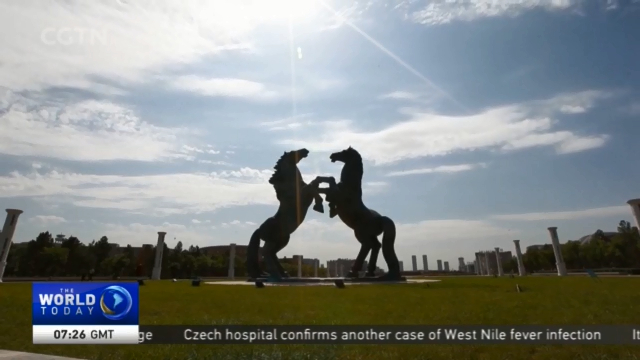
15:42, 02-Oct-2018
Retracking the Ancient Silk Road: Ordos: Steppe culture helps transform local economy
Updated
15:09, 05-Oct-2018
02:51

The city of Ordos in North China's Inner Mongolia Autonomous Region is one of the country's most prosperous cities in terms of per capita GDP. However, its economy is heavily dependent on its rich natural resources from the Ordos Plateau. In recent years, the city has turned to its equally rich cultural heritage to find more sustainable development. MARK FONTES has the story.
A cultural exhibition on the Mongolia Steppe with Morin Khuur, or horsehead fiddle performance, Mongolian dancing, and ethnic costumes. Ordos city lies near the bend of the Yellow River, an area where China's nomadic culture meets its agriculture. The region is as rich in cultural heritage as it is in natural resources.
DING GUILIANG ORDOS PUBLIC CULTURAL ART CENTER "By the end of 2017, we had six elements listed into the national intangible cultural heritage. We also identified nine national bearers of intangible cultural heritage. We are applying to be a national intangible cultural heritage protection zone."
Ordos' economy has long been dominated by sheep herding, coal mining, and natural gas. But as the mindset of both its people and local government changes, the city is now cultivating an industry centered around its heritage.
DING GUILIANG ORDOS PUBLIC CULTURAL ART CENTER "We have invited modern designers to work with our craftsmen. Many of the locals already have their own workshops and stores, and no longer need government support. We are also building an e-commerce platform to help our craftsmen broaden their market."
A long piece of leather carving depicting scenes from the silk road stuns the visitors. Carved leather was used to decorate the satchels and purses of traders traversing the silk road years ago. However, its creator thinks the art should not just stay in the museums.
LIU ZAO FOUNDER OF NA SHI CI STUDIO "We also make wares for day-to-day use, such as purses. China has a rich cultural heritage, but I don't think we should lock examples of it up in a museum. Bringing them back to everyday life is the best way to preserve them. But to be honest, the market for them is still small. I hope through the Belt and Road Initiative, we can bring the art of the Ancient Silk Road back to life."
Ordos has always prospered thanks to its natural resources. But as the city's economy transforms, hopes are high that the city will shake its dependence on those resources through more creative industries like tourism. MARK FONTES, CGTN.

SITEMAP
Copyright © 2018 CGTN. Beijing ICP prepared NO.16065310-3
Copyright © 2018 CGTN. Beijing ICP prepared NO.16065310-3